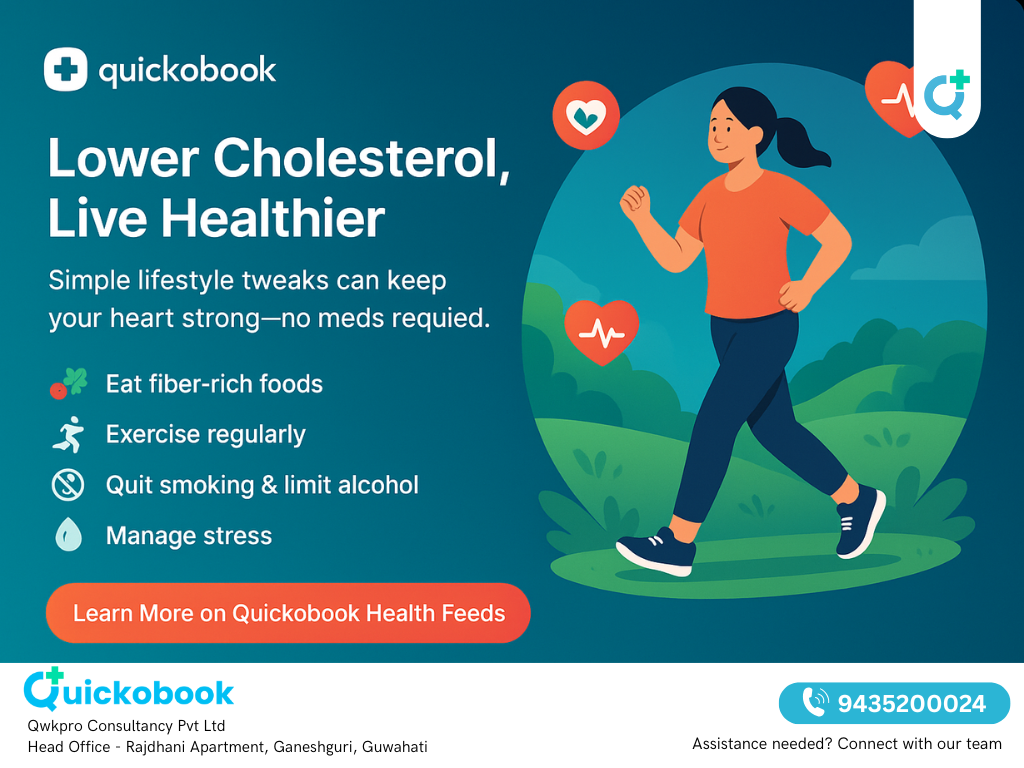Introduction
High cholesterol is one of India’s most common health issues today. With growing rates of diabetes and heart disease, many people are searching for natural ways to maintain healthy cholesterol levels.
The truth is—your everyday habits play a much bigger role than you think. By focusing on simple, sustainable lifestyle changes, you can lower bad cholesterol (LDL), raise good cholesterol (HDL), and reduce the risk of diabetes and heart problems—all without relying solely on medicines.
What Is Cholesterol and Why It Matters
Cholesterol is a waxy, fat-like substance found in your blood. It’s essential for hormone production and digestion, but too much of the wrong type can be harmful.
Types of Cholesterol
- LDL (Low-Density Lipoprotein): Known as “bad cholesterol,” it can clog arteries and increase heart disease risk.
- HDL (High-Density Lipoprotein): Called “good cholesterol,” it removes LDL from your bloodstream.
Maintaining the right balance between LDL and HDL is vital—not just for your heart, but also for blood sugar control and overall metabolic health.
Causes of High Cholesterol
- Diet high in saturated and trans fats
- Lack of regular physical activity
- Obesity and abdominal fat
- Smoking and excessive alcohol
- Stress and poor sleep patterns
- Genetic predisposition
Common Signs and Symptoms
High cholesterol often develops silently. You may not feel anything until it causes complications such as:
- Chest discomfort or breathlessness
- Fatigue or dizziness
- Yellowish deposits around eyes (xanthelasma)
- Tingling or heaviness in limbs
A lipid profile test is the best way to detect cholesterol imbalance early.
Diagnosis and Tests
Your doctor may recommend:
- Lipid Profile Test: To check LDL, HDL, total cholesterol, and triglycerides.
- Blood Sugar Test: To assess diabetes risk.
- Blood Pressure Measurement: Since cholesterol and hypertension often coexist.
Regular screening every 6–12 months is essential for adults, especially if you have a family history of heart disease or diabetes.
Lifestyle Changes to Lower Cholesterol Naturally
1. Eat Heart-Healthy Foods
A balanced Indian diet rich in fiber, antioxidants, and healthy fats can naturally lower LDL levels.
Include:
- Whole grains like oats, barley, and millets
- Fruits such as apples, oranges, and amla
- Vegetables like spinach, broccoli, and beans
- Nuts and seeds – almonds, walnuts, flaxseeds
- Healthy oils – mustard, olive, and rice bran oil
- Fatty fish like salmon or rohu (rich in omega-3)
Avoid:
- Deep-fried and processed foods
- Sugary beverages and refined flour
- Excessive butter, ghee, or red meat
2. Maintain a Healthy Weight
Even a 5–10% reduction in body weight can improve cholesterol and blood sugar levels.
- Track portion sizes
- Eat slowly and mindfully
- Avoid late-night meals
3. Exercise Regularly
Physical activity increases HDL (good cholesterol) and improves heart strength.
Recommended routine:
- 30–45 minutes of brisk walking, 5 days a week
- Yoga or pranayama for stress control
- Light strength training twice a week
4. Quit Smoking and Limit Alcohol
Smoking lowers HDL and damages arteries. Quitting can restore good cholesterol levels.
Limit alcohol to 1–2 drinks per week or avoid it completely.
5. Manage Stress and Sleep
Chronic stress and poor sleep increase cortisol, which affects cholesterol metabolism.
- Practice meditation, deep breathing, or hobbies
- Get 7–8 hours of quality sleep nightly
6. Control Blood Sugar and Blood Pressure
People with diabetes or hypertension are more likely to have high cholesterol.
Monitor your levels regularly and follow your doctor’s guidance for diet and medications.
Prevention Tips
- Get regular health check-ups
- Replace fried snacks with fruits or nuts
- Stay hydrated (2–3 liters of water daily)
- Avoid prolonged sitting—take movement breaks
- Keep waist circumference below 90 cm (men) and 80 cm (women)
When to See a Doctor
Consult your doctor if you experience:
- Chest discomfort or irregular heartbeat
- Dizziness, fatigue, or shortness of breath
- Family history of high cholesterol, heart attack, or diabetes
You can easily book a general physician or cardiologist consultation through Quickobook — available for both online and in-clinic visits anywhere in India.
Treatment Options (When Lifestyle Isn’t Enough)
If natural methods are insufficient, your doctor may suggest:
- Statins: To reduce LDL cholesterol
- Fibrates: To lower triglycerides
- Niacin or Omega-3 supplements: To balance overall lipid levels
Always consult your doctor before starting or stopping any medication.
Conclusion
A heart-healthy lifestyle is the most effective and sustainable way to lower cholesterol and prevent diabetes. Eating balanced meals, exercising regularly, avoiding tobacco, and sleeping well can protect your heart naturally.
Remember—prevention is better than prescription.
Start today. Your heart will thank you tomorrow.
Quickobook Care Tip
If you’re due for a health check-up or want to discuss your cholesterol and sugar levels, book a consultation on Quickobook.
Find trusted general physicians, diabetologists, and cardiologists near you — anytime, anywhere.
Frequently Asked Questions (FAQs)
Q1. Can lifestyle changes really lower cholesterol?
Yes. A healthy diet and regular exercise can significantly reduce LDL and improve HDL levels.
Q2. How long does it take to see results?
With consistent effort, results usually appear within 6–12 weeks.
Q3. Can stress cause high cholesterol?
Yes. Chronic stress raises LDL and triglycerides through hormonal imbalance.
Q4. Is rice bad for cholesterol?
Brown or red rice in moderation is fine; avoid polished white rice in large portions.
Q5. Are eggs safe to eat?
Yes, up to 3–4 eggs per week for healthy adults.
Q6. How often should I test my cholesterol?
At least once a year, or more often if you have diabetes or heart disease risk.
Q7. Does drinking green tea help?
Yes, green tea antioxidants help reduce LDL cholesterol.
Q8. What are the best fruits for cholesterol?
Apples, berries, citrus fruits, and amla are excellent choices.
Q9. Can yoga help lower cholesterol?
Yes, yoga reduces stress hormones and supports better lipid metabolism.
Q10. Does skipping meals affect cholesterol?
Yes. Irregular eating can cause hormonal imbalance and raise LDL.
Q11. Can high cholesterol be reversed?
In many cases, yes—with consistent lifestyle changes and monitoring.
Q12. How does sleep affect cholesterol?
Poor sleep increases bad fats and inflammation in the body.
Q13. Should I take supplements for cholesterol?
Only under medical advice. Natural diet is preferred first.
Q14. Can high cholesterol cause diabetes?
Both conditions share similar causes like obesity and poor diet.
Q15. Is coconut oil good for heart health?
Use sparingly. It contains saturated fats that can raise LDL.
Q16. How much exercise is enough?
150 minutes of moderate exercise per week.
Q17. Does weight loss always reduce cholesterol?
Yes, even modest weight loss improves lipid profile.
Q18. What are triglycerides?
A type of fat in blood; high levels increase heart risk.
Q19. Is cholesterol always bad?
No, HDL cholesterol is protective and essential for health.
Q20. Can children have high cholesterol?
Yes, especially if overweight or with poor diet habits.
Disclaimer
This blog is for educational purposes only. It does not replace professional medical advice, diagnosis, or treatment. Always consult your doctor for personalized guidance.











Comments (0)
No comments yet. Be the first to share your thoughts!
Leave a Comment